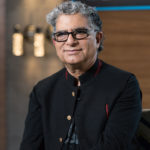Jackie Chan has felt fear. That’s what he tells me, though I’m not sure I believe him.
He says, “When I am faced with doing a dangerous stunt, I would be lying if I said I never get scared.”
Makes sense. We all feel fear, of course. But in general, when we’re doing what we love, can we really call it fear?
Thus the root of my skepticism: Chan appeared in his first film at age 8 and today he’s 56. He’s been doing action films, stunt work and fight scenes for 48 years. A reasonable person could argue that what he’s talking about is not fear, but the sweet, reckless burn of adrenaline. That’s less fear, more exhilaration fueled by risk, and a lot of people thrive on it every day. Maybe it feels like fear. But it’s never held back Jackie Chan from anything. In fact, that adrenalized state may be more responsible for his ongoing success than anything.
But in the course of our conversation, Chan tells me two stories. Each of them details a very clear and defining moment, which combined to make Chan feel a different kind of fear—terror, really—that nearly paralyzed him and derailed everything he’d built up until that point.
These events happened a long time ago to a Jackie Chan we, in the United States, never got to know because thankfully they taught him some nasty lessons about the difference between ego and soul.
How we sell ourselves to the world defines who we are to anyone who shakes our hand. Chan realized he had to remake the product he was selling. To understand, you need to look at how he lives his life today. How he transformed himself cuts right to the core of his success—and his entire character.
***
It started with school. Or a lack of it. Born in Hong Kong, “I never received a proper academic education,” he says. “I never learned to read or write. These are things I have taught myself over the years.” The education he did get came at a martial arts academy, which of course opened a path to film stardom. “I learned all the skills that helped me become a success as an action star, but the one thing that I regret about my past is never having an opportunity to go to school to learn academics.”
Philanthropy is a major part of Chan’s life now, a progression of bigger and bolder charities he’s founded over the years, many of them geared around educating disadvantaged children. “In many remote areas of China, children don’t have the basic necessities for an education. The school buildings are either dilapidated or non-existent. My Dragon’s Heart Charity team finds these places and then I visit them to see for myself what the conditions are like. We have a ceremonial groundbreaking and I meet the children and the teachers and tell them that I will build them a school and that I will come back to visit when the school is finished. There is nothing in the world as satisfying as returning to see the brand new school, to see the children in their new uniforms carrying backpacks containing all the supplies they need for a good education. It is very emotional and joyful for me.”
He tells some moving stories about his experiences. The little girl who needed glasses so badly that she bumped into walls, couldn’t attend school or play sports. She didn’t want to burden her family with the cost. (“Two dollars U.S.,” he marvels. “Can you imagine this?”). Or there’s the handicapped teacher who walked several miles to and from school on crutches because he had no legs, yet was still driven to teach. “There are endless stories. I do the best I can to help as many people as possible. No one should have to suffer, especially children.”
Many successful people start charities and give back, of course. Chan makes it very personal, however. He does as much of it as he can in person, actually meeting the people he helps. There’s a reason: He wasn’t always like this. In fact, in his own words, he describes young Jackie Chan as a guy with “a bad attitude, so full of himself.”
“I didn’t have any idea what I was doing,” he says. “When I was 20, one day I had five dollars U.S., the next day I’m a millionaire. I had no education, so I started buying luxury cars, jewelry. All I cared about was how to spend.”
This led to one of those defining moments: His first foray into charity work—but the lip-service, image building, P.R.-type of giveback. “My manager arranged for me to visit a children’s hospital to give out Christmas gifts,” he recalls. “When I got to the hospital, there was a pile of wrapped presents and all these sick little kids. I handed out the gifts, but I had no idea what was inside the boxes. I hadn’t picked any of them out myself—my manager had done that. When those little kids started thanking me for being so nice and bringing them presents,” he pauses here. “I felt like such a fraud.”
***
Chan’s films—he’s best known in the United States for the Rush Hour movies—are a whirlwind of action and slapstick comedy. His characters are always in just-this-much over their heads, which of course leads to the laughs. Incredible fight choreography helps, too. No one uses an aluminum ladder against multiple foes like Chan. His style is no accident. When it came time to first sell the Jackie Chan brand—long before “branding” was standard-issue business-speak—Chan faced expectations and had to make a choice.
“When Bruce Lee passed away, [filmmakers] looked to me as a replacement for him,” he says. “I realized quickly that no one could be just like he was, so I started adding humor to the action and developed my own unique style.”
It was the smartest thing he could’ve done. Not only did it help him dodge what would’ve been an inevitable backlash against him by Bruce Lee purists, he became, all by himself, Jackie Chan.
What he didn’t expect? Becoming a self-absorbed, venal, twentysomething movie star. By the end of the ‘70s, Chan was China’s highest-paid movie star. The next logical step: Go to the United States and do American films. His debut was The Cannonball Run, an epic farce about a cross-country road trip starring Burt Reynolds, who at the time was America’s highest-paid movie star. And a funny (but not to him) thing happened when Chan got here.
“I thought I was a big star,” he says. “And people would ask my name. I say, ‘Jackie Chan!’ They say ‘What? Who?’ Jackie Chan! I say. Nobody knows me. The big star was Burt Reynolds. I was making half-a-million dollars U.S. [per film]. Burt Reynolds was making 5 million. I said, ‘My God. He’s the big star. I’m nothing.’”
And Jackie Chan felt an amazing thing: Fear. Real, honest fear about what he thought he was, seeing what he really was, and realizing that his entire future depended on what he would become. “There are two kinds of human beings,” he says. “One is a good person; you’re respected, everyone remembers you, and 50 years later they’re still talking about you.” He’d become the other kind of person, whose values were paid for in cash.
But what could he do about it? He was still a young hotshot with no formal education or any experience being a “real” person. Where should he begin? What should he change? Even worse, how could he change, when he’d already worked for years creating a box-office persona the folks back home had embraced?
The answer would come soon with Chan’s hospital Christmas present episode. That sealed the deal and he started down a different path. And the change wasn’t as difficult as he thought it would be.
“That day I vowed never to do something like that again. From then on I actually did go out and choose the gifts for the kids and when I brought them to the hospital and handed them out, I felt that I was doing the right thing. That experience really changed my thinking. I realized, What have I done for this world, for myself, for my family? Nothing. I totally changed my approach.”
***
He made more films. He started more charities. And he found he enjoyed the charities as much as he enjoyed his work. He didn’t have to sell anything. The change he made in himself, a change to make sure he never felt that way again, was legit. “I realized that when I see somebody smiling, I’m happy,” he says. “So one by one, year by year, I do more charities and it makes me happier. It was a snowball getting bigger and bigger.”
Genuine laughter and enthusiasm became the foundation of Jackie Chan’s brand—which is now a multimillion-dollar venture even if you don’t count the movies. Chan does an incredible amount of side work as an entrepreneur and businessman, though he’s not known for it here because he does so much of it in China. He has interests in state-of-the-art movie theaters, restaurants, gyms and more. In a way, he’s become a developing market ambassador.
“Every day I have a thousand thousands of things to do,” he says. “When I get tired, someone will sit down with me and talk about a project or business or a charity, and I just wake up. I’m interested in every business because right now China just opened and everyone around the world—especially the U.S.—wants to get in. I’m lucky that for the last 20 years I have very good connections with American friends, so anytime they want to get into the Chinese market, they talk to Jackie. Sometimes I help them. Sometimes I’m their partner, then we both make money. I take what I need for myself and the rest goes to charity.”
And they buy in like crazy because what he’s selling—Jackie Chan—is the genuine article.






